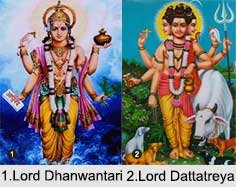![]() Minor Avatars of Lord Vishnu are incarnations of the God that contain part of his divine spirit and power. It is believed that an Avatar of Lord Vishnu appears whenever the world or humans are in danger, and in this way, the God helps to overcome evil, bring justice, and restore order. Lord Vishnu is worshipped as the Supreme Being commonly known as Narayana or Hari.
Minor Avatars of Lord Vishnu are incarnations of the God that contain part of his divine spirit and power. It is believed that an Avatar of Lord Vishnu appears whenever the world or humans are in danger, and in this way, the God helps to overcome evil, bring justice, and restore order. Lord Vishnu is worshipped as the Supreme Being commonly known as Narayana or Hari.
The Puranas speak of the 10 avatars of Lord Vishnu. These incarnations shed light on various stages of human evolution. The ten most famous incarnations of Vishnu are collectively known as the "Dasavatara". Besides these, there are several other minor incarnations of the Lord that have been discussed in details below:
Kapila: Sage Kapila has been considered as one of the minor incarnations of Lord Vishnu. Son of Kardama Muni and Devahuti, the sage finds his mention in the Bhagavata Purana. The sage has been identified with Agni, the God of Fire who shattered with its one glance almost 60,000 sons of King Sagara who went in search of their sacrificial horse to the netherworld where Kapila Muni was engrossed in deep meditation.
Dattatreya: Dattatreya is the son of rishi Atri and Anasuya but is believed to be the son of Vishnu born of his emanation which fecundated the wife of the rishi. Dattatreya, a teacher of the anti-Gods, originator of the Tantras and Tantric rites, restored Vedic rites and created the Soma plant.
Hayashirsha: Hayashirsha is the horse-headed incarnation of Lord Vishnu born to protect the scriptures, is closely identified with Hayagriva. Danavas Madhu and Kaitabha stole the Vedas while Lord Brahma was asleep and dived into the ocean with them. Brahma thus, created Hayashirsha and sent him to the bottom of the ocean to retrieve them.
Yajna: Yajna means ritual sacrifice. During the age of Swayambhuva Manu, Ruchi got married to Akuti, the daughter of Swayambhuva Manu. Later Yajrta (Ritual sacrifice) and Dakshina (Sacrificial fee) were born to them. They got married and then gave birth to the twelve Yamas.
 Dhanwantari: Lord Dhanwantari, an incarnation of Lord Vishnu, is a solar divinity embodied as the physician of the Gods. He evolved from the Samudra Manthan carrying in his hands the cup containing amrita. He is sculptured as a handsome man carrying in both hands a vessel containing Amrita, the drink of immortality.
Dhanwantari: Lord Dhanwantari, an incarnation of Lord Vishnu, is a solar divinity embodied as the physician of the Gods. He evolved from the Samudra Manthan carrying in his hands the cup containing amrita. He is sculptured as a handsome man carrying in both hands a vessel containing Amrita, the drink of immortality.
Ved Vyas: Ved Vyas, known as the compiler of the Vedas, is also considered a minor incarnation of Lord Vishnu. He is depicted as of slender build, dark complexioned, wearing dark brown jata on his head. His disciples Sumanta, Jaimini, Paila, Vaishampayana are seen by his side.
Rishabha: Rishabha, meaning morality, was one of the hundred sons of Nabhi and his wife Meru and a minor incarnation of Lord Vishnu. Their eldest son was Bharata. Rishabha is considered to be the original founder of the philosophy that defines morality.
Nara and Narayana: Nara and Narayana are the two saints who are always associated together. They are the sons of Dharma (righteousness) and Ahimsa (non-violence). Narayana is identified with Vasudeva who is omnipotent. According to the Mahabharata, Arjuna and Krishna in one of the incarnations were Nara and Narayana.
Balarama: Balarama, generally worshipped along with Lord Krishna, is his elder brother and the 7th avatar of Lord Vishnu. Vishnu took two of his hair, one black and one white. The black hair was born as Krishna from the womb of Devaki. Balarama was born of the white hair and his foetus was miraculously transferred from the womb of Devaki to that of Rohini, the second wife of Vasudeva.
Narada: Narada, better known as Narada Muni, is also a minor incarnation of Lord Vishnu. Considered as one of the Saptarishis, in Mahabharata, he is a son of Kashyapa. In the Puranas, he is mentioned as a son of Lord Brahma, born from his throat. The credit of invention of the Vena is attributed to Narada.
Manmatha: Manmatha, identified with Pradyumna, is a minor incarnation of Lord Vishnu. Regarded as "Kama Deva", he is the God of love who was burnt to ashes by Lord Shiva as he kindled the longing in him for Parvati when he was occupied in meditation. Shiva however, was moved by the tears of his wife Rati promising her that her husband would be born as a grandson of Lord Krishna.
Prithu: Prithu, the first man to be crowned as a king, is considered as a minor incarnation of Lord Vishnu. He is known to have began agriculture, milked the mother earth and provided man food and milk. He was the son of Vena, born of his thigh.
According to Vishnu Purana, Vena was earlier crowned as the king but his wicked nature provoked the sages to kill him. To prevent anarchy to spread on earth, the sages rubbed the thigh of the dead king to produce a son. He was proclaimed as the first king.
Mohini: During Samudra Manthan, Lord Vishnu took the form of an exceedingly beautiful woman, Mohini to prevent the demons from consuming the amrita. After distributing the drink to the Devas, Mohini flew away with it.




















